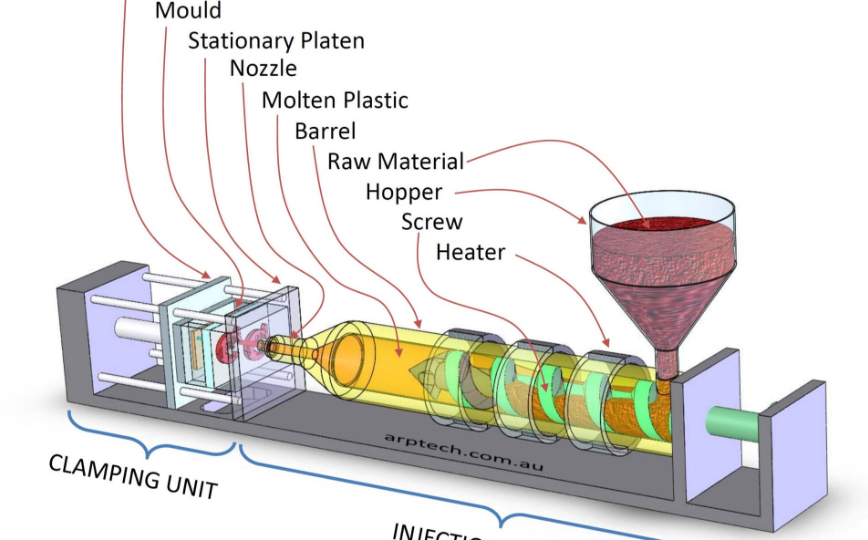
The cost of injection molding can vary significantly based on several factors, including the complexity of the part, the type of material used, the size of the production run, and the specifics of the mold design. Here’s a breakdown of the primary cost components involved in injection molding:
1. Mold Costs
Initial Mold Design and Production
- Simple Molds: For basic designs, the cost can range from $3,000 to $10,000.
- Complex Molds: For intricate designs with multiple cavities, complex geometries, or moving parts, the cost can range from $25,000 to over $100,000.
- Prototype Molds: Temporary molds made for testing can be less expensive, typically ranging from $1,000 to $5,000.
Factors Affecting Mold Costs
- Material: Steel molds are more durable and expensive than aluminum molds.
- Number of Cavities: More cavities can reduce the cost per part but increase the initial mold cost.
- Precision and Complexity: Higher precision and more complex features add to the mold cost.
- Mold Life Expectancy: High-production molds are built to last longer, which increases cost.
[elementor-template id=”4330″]
2. Production Costs
Material Costs
- Type of Plastic: Common plastics like polypropylene and polyethylene cost less than specialty or high-performance plastics like PEEK or polycarbonate.
- Volume: Higher volume purchases of raw materials can reduce per-unit costs.
- Additives: Colorants, UV stabilizers, and other additives can increase material costs.
Machine Time
- Cycle Time: Shorter cycle times reduce machine costs per part. Cycle time is influenced by part complexity and material cooling rates.
- Machine Size: Larger machines capable of higher clamping forces (measured in tons) are more expensive to operate.
Labor Costs
- Setup and Tuning: Initial setup and tuning of the machine can be labor-intensive.
- Automation: Higher levels of automation reduce labor costs per part.
3. Secondary Processes
Post-Processing
- Trimming and Finishing: Removing excess material (flash) and finishing surfaces.
- Assembly: Additional assembly of components if required.
- Quality Control: Inspections and testing to ensure part quality.
Additional Treatments
- Painting or Coating: Adding protective or decorative coatings.
- Printing: Adding labels or logos through printing processes.
[elementor-template id=”4331″]
4. Production Volume
Low Volume (1,000-10,000 units)
- Higher per-unit costs due to the significant impact of initial mold costs.
- Often uses simpler or prototype molds.
Medium Volume (10,000-100,000 units)
- Reduced per-unit costs as mold costs are amortized over more parts.
- Suitable for small to medium-sized enterprises.
High Volume (100,000+ units)
- Lowest per-unit costs due to economies of scale.
- Ideal for mass production and large-scale manufacturing.
Cost Estimation Example
For a simple plastic part:
- Mold Cost: $10,000 (simple steel mold with few cavities)
- Material Cost: $1 per pound, with each part weighing 0.1 pounds
- Machine Time: $50 per hour, with a cycle time of 30 seconds per part
- Labor and Overhead: $20 per hour
Per-Unit Cost Calculation (for 100,000 units):
- Mold Cost Per Unit: $10,000 / 100,000 = $0.10
- Material Cost Per Unit: $1 per pound * 0.1 pounds = $0.10
- Machine Cost Per Unit: ($50 per hour / 120 parts per hour) = $0.42
- Labor Cost Per Unit: ($20 per hour / 120 parts per hour) = $0.17
Total Per-Unit Cost: $0.10 (mold) + $0.10 (material) + $0.42 (machine) + $0.17 (labor) = $0.79
[elementor-template id=”4330″]
Conclusion
The cost of injection molding varies widely based on the factors mentioned above. While the initial setup and mold costs can be substantial, the process becomes cost-effective for larger production runs due to the economies of scale. Careful planning and optimization of the design and production process can significantly impact overall costs.
Related Conten: Injection Molding Factory / Plastic Parts Manufacturer
 DTG Mould Trade Process |
|
| Quote: | According to sample, drawing and specific requirement. |
|---|---|
| Discussion | Mold material, cavity number, price, runner, payment, etc. |
| S/C Signature | Approval for all the items. |
| Advance | Pay 50% by T/T |
| Product Design Checking | We check the product design. If some position is not perfect, or can not be done on the mould, we will send customer the report. |
| Mold Processing | Send report to customer once each week |
| Mold Testing | Send trial samples and try-out report to customer for confirmation |
| Mold Modification | According to customer’s feedback. |
| Balance Settlement | 50% by T/T after the customer approved the trial sample and mould quality. |
| Delivery | Delivery by sea or air. The forwarder can be designated by your side. |
 |
|
